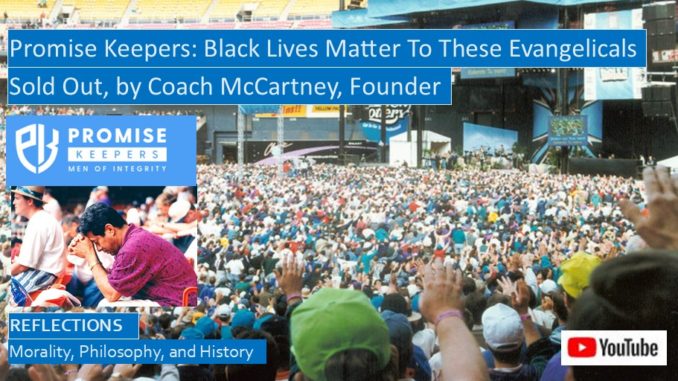
Our country is so incredibly divided. In todays’ racially charged atmosphere, many people who are not believers wonder: Are white evangelicals racist? Do all white evangelical leaders oppose the Black Lives Matter movement?
There are many evangelical leaders who do support the philosophy of the Black Lives Matter movement. In particular, the Promise Keepers movement has explicitly supported racial reconciliation with out black brothers for decades.
Promise Keepers was founded in 1990 by Coach Bill McCartney. He was the head coach of the University of Colorado with a winning record from 1982 to 1994. His team won three consecutive Big Eight Conference titles and the national championship in 1990.[1] While attending a Fellowship of Christian Athletes banquet, he discussed with Dave Wardell the idea of Promise Keepers, an organization that would organize conferences that would train and teach young men on what it means to be godly husbands, godly fathers, and godly men.[2]
NOTE: Used copies are like a dollar plus shipping.
Many black athletes see college and professional sports as their ticket out of poverty. Many blacks attending college on athletic scholarships only know poverty, attended sub-standard ghetto schools, and really have a hard life and often have a difficult time in college. Bill McCartney witnessed first-hand how the lack of opportunity for these black families affected his black athletes.
This experience affected the message of Promise Keepers. Promise Keepers asks the young men in its ministry to make seven promises to live a godly life. This is the sixth promise: A Promise Keeper is committed to reaching beyond any racial and denominational barriers to demonstrate the power of biblical unity.
https://promisekeepers.org/promise-keepers/about-us/7promises/
FIRST PROMISE KEEPERS CONFERENCE
At the first Promise Keeper conference, although Coach McCartney was elated by the attendance and fervor of those attending, the one thing that sent a chill down his spine was that the crowd was almost entirely white. Coach McCartney addressed these men, saying “Next year at Folsom Stadium we expect a sellout. But I believe that if we fail to gather a fair representation of all of God’s people, God will not join us.”
In his book Coach McCartney continues:
The elated crowd left on a wave of exhilaration that would only be multiplied in years to come. But my last remarks on the racial issue had clearly hit a raw nerve, igniting a minor firestorm of hate mail and caustic letters, chastising me, saying, “How dare you imply that in a stadium filled with men glorifying Jesus Christ, God won’t be there.” Others stated angrily, “God did not state in Scriptures, ‘Go ye therefore and eradicate racism.’ He said, ‘Go preach the gospel to all nations.’”[3]
RACIAL RECONCILIATION: A HARD TEACHING
We will let Coach McCartney speak from his book in this section:
Shortly after Promise Keepers’ first stadium conference of twenty-two thousand men in 1992, again, a mostly white audience, a much heavier burden fell upon me. I had begun to see many of the subtle ways our culture inflicts pain, shame, and lack of opportunity on the minority communities in our midst. And it horrified me to see this dynamic thriving in the church as well.
With the help of Christian broadcaster James Dobson, I began scheduling speaking engagements at churches across the country, delivering a controversial message on racial reconciliation. I would show up to churches filled with men eager to hear about the marvelous movement of God called Promise Keepers, and I would begin to share. I spoke from my experience as a football coach, recognizing in my players’ faces a conditioned resignation toward cultural injustice; I tried to explain how a subtle spirit of white superiority has unwittingly alienated and wounded our brothers and sisters within the church, and how the ten o’clock hour on Sunday morning is the country’s most segregated hour of the church.
“My heart is broken for why I am standing here today,” I cried out. “The church is standing on the shore while the tidies taking our brothers and sisters of color out to sea. We must get in touch with reality. We have oppressed men and women of color. We will not have revival until we have reconciliation.”
But always when I finished there was no response, nothing. No applause. No smiles. Everyone instead looked crestfallen. In city after city, in church after church, it was the same story: wild enthusiasm while I was being introduced, followed by a morgue-like chill as I stepped away from the microphone.
As my speaking tour came to a close, I had an engagement at a church in Portland, Oregon. My message ended to the usual wall of silence. Yet before I could leave the podium, a black speaker at the back of the stage stood up. I paused as he began to walk toward me. He approached the podium and stood there for what seemed like minutes, trying to gather himself. After a long delay, he finally said, “I never thought, that in my lifetime, I would ever hear a white man say what this man has said.” He paused to compose himself. The church was stone silent. In a tone that broke my heart, he concluded: “Maybe there is hope.”
As of 1997 the racial message remained a highly-charged element of the Promise Keepers’ ministry. Recent correspondence told us that, of the 1996 conference participants who had a complaint, nearly 40 percent reacted negatively to the racial reconciliation theme. I personally believe that it was a major factor in the significant fall-off in Promise Keepers 1997 attendance, racial reconciliation is simply a hard teaching for many.[4]
OTHER MESSAGES FROM COACH MCCARTNEY’S BOOK
Coach McCartney’s book, Sold Out, is a personal testimonial on how he recommitted himself to the Lord, his life experiences as a football coach and as the founder of Promise Keepers, and his very human responses to the extreme stresses this very hectic and public life placed on him and his family. He had some problems with social drinking, but his very successful football career responsibilities of a winning head coach meant he was often out of town, and when in town he rarely made it home for dinner, and never on the weekends during football season.
Also included are sections penned by his wife Lyndi. Football was her life also, because she really wanted to support her husband and encourage him. Her father had been forced to abandon a low paying job that he loved, and she had seen how that really destroyed his spirit, so she thought it would be unthinkable to insist that he change his career course.
Then Coach McCartney started up Promise Keepers and the scheduling issues worsened. Recruiting was year-round, but at least the end of the football season meant he was around the family a little bit more. But Promise Keepers was really a year-round endeavor. He needed to speak at all the conferences.
So the head of Promise Keepers, the ministry teaching young men to be better husbands and fathers and spend more time with his family, finally noticed Lyndi had locked herself in her room for months on end. They both went to marriage counselling, so he could learn how to be a better husband and father. Finally, Coach McCartney decided that at the end of a winning season and at the very height of his successful college football coaching career, he would step away from football altogether to devote his full-time efforts to his family and to Promise Keepers.[5]
You can order a used copy of Coach McCartney’s book, Sold Out, on Amazon for a dollar plus shipping. This is a testimonial we can all learn from. This review for this book in also worth reading on its own merit:
https://www.christianitytoday.com/ct/1998/may18/8t6026.html
MY EXPERIENCE WITH PROMISE KEEPERS
I attended a Promise Keepers event with a church group in the early days when they were able to partially fill large football stadiums with their events. Like the Billy Graham rallies, though they were definitely evangelical in their language, they encouraged participation by all Christians, Catholics included, and encouraged attendees to become active in their local churches.
There were very few young black men who attended the conference, but it was not for lack of trying. The conference booked black preachers as speakers, blacks have always been part of the leadership in Promise Keepers, and racial reconciliation was always a main theme of the events.
I encountered a similar experience in my twentieth high school reunion. Desegregation was happening when I attended junior and senior high school. There was another black high school reunion in a ballroom near ours, there was all kinds of dancing and celebration, but in our white high school reunion ballroom the tone was more subdued. But none of the blacks who attended our high school felt enough of a connection to attend the reunion.
Promise Keepers, in my observation, was plagued by the “been there, done that” tendency, many men only attended one conference. At the movement’s peak they had an event in Washington DC that they promoted a million man march, perhaps 800,000 attended. Coach McCartney was so frustrated about the lack of black participation that he made the conference fees optional, which did not attract many black attendees, but which did destroy the finances of the organization, leading to massive staff layoffs, leaving a bad taste for many.
Coach McCartney has had to resign entirely from the organization due to serious age-related health problems. Promise Keepers is certainly an organization worthy of support. We should pray for its future success.
PROMISE KEEPERS VIRTUAL EVENT
This year Promise Keepers held a free virtual event that can be heard in its entirety on YouTube. Promise Keepers continues to encourage racial reconciliation as a core principal of its ministries, many of the leading speakers in the conference were black pastors:
https://www.youtube.com/user/PromiseKeepers
[1] https://en.wikipedia.org/wiki/Bill_McCartney
[2] https://en.wikipedia.org/wiki/Promise_Keepers
[3] Bill McCartney, Sold Out (Word Publishing: 1997), pp. 177-178.
[4] Bill McCartney, Sold Out, pp. 179-181.
[5] Bill McCartney, Sold Out, pp. 203-247.

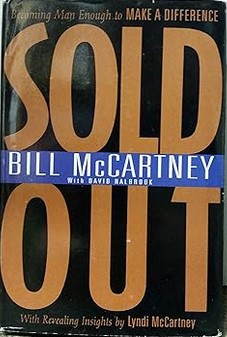
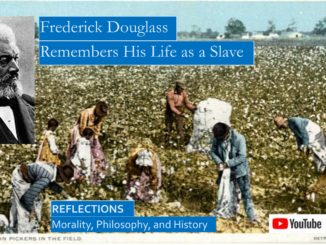
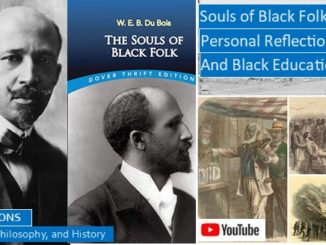
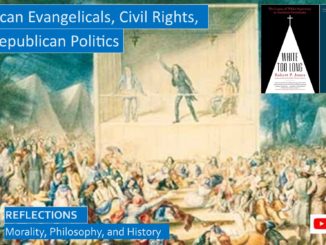
Be the first to comment